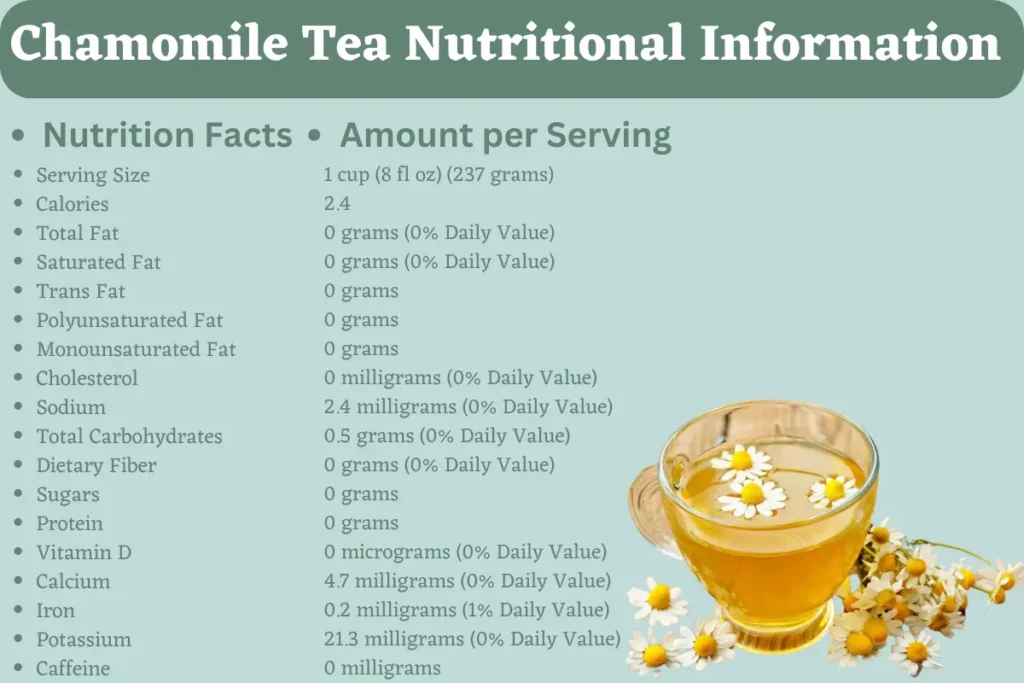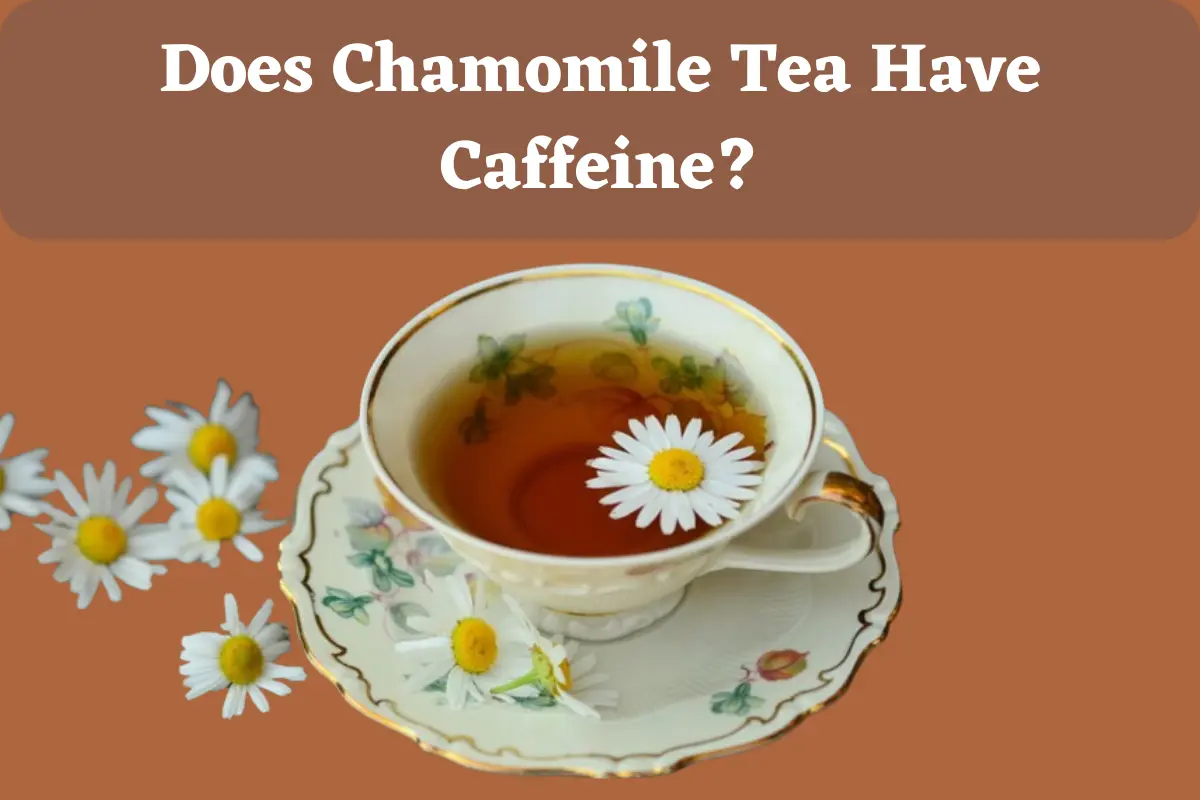Chamomile tea, with its delicate floral notes, has been a staple in traditional medicine for centuries, valued for its calming and soothing properties. Unlike traditional teas derived from the Camellia sinensis plant (such as black or green tea). Does Chamomile Tea Have Caffeine? No, chamomile is naturally caffeine-free.
This characteristic makes it a popular choice for those seeking a relaxing beverage before bedtime or during moments of stress. But does this mean chamomile tea is entirely devoid of caffeine, and what are the wider implications of this for those who consume it?
Importance of Knowing about Chamomile Tea
Chamomile tea is a beloved herbal beverage enjoyed by people worldwide. Made from the dried flowers of the chamomile plant, this tea is a popular choice in many countries, including the United States, United Kingdom, Germany, and Egypt. As health awareness grows and the demand for natural beverages increases, the global herbal tea market, including chamomile tea, is expected to expand.
Individuals seeking relaxation and stress relief, those with sleep issues or insomnia, people looking for a caffeine-free alternative to coffee or traditional teas, and health-conscious consumers interested in the potential benefits of herbal teas may find chamomile tea particularly appealing. Moreover, people with digestive problems who seek natural remedies may find solace in chamomile tea.
However, one of the most prevalent misconceptions surrounding herbal teas, including chamomile, is the assumption that all herbal teas are inherently caffeine-free. While it’s true that pure herbal teas like chamomile, mint, or rooibos do not contain caffeine, the landscape becomes more complex with the proliferation of tea blends on the market.
These blends often mix herbal ingredients with traditional tea leaves, such as black or green tea, which do contain caffeine. This distinction is crucial for consumers seeking the calming and sleep-promoting benefits of herbal teas, only to inadvertently consume caffeine.
Does Chamomile Tea Have Caffeine?
No, Chamomile tea is a naturally caffeine-free herbal tea. Unlike teas derived from the Camellia Sinensis plant—such as black, green, white, and oolong teas—chamomile tea is made from the flowers of the chamomile plant, which do not contain caffeine. This absence of caffeine makes chamomile tea an excellent choice for those looking to unwind or prepare for a restful sleep without the stimulant effects associated with caffeine.
Various chamomile tea brands, such as Taylors of Harrogate, Harney & Sons, and Traditional Medicinals, focus on providing pure chamomile products that retain the naturally caffeine-free characteristic of the herb.
However, it’s important to note that while pure chamomile tea is caffeine-free, some tea blends that include chamomile as one of the ingredients may contain caffeine if they also contain teas made from the Camellia Sinensis plant (like black, green, white, or oolong teas).
Therefore, if you’re seeking the caffeine-free benefits of chamomile tea, it’s advisable to choose products that are labeled as 100% chamomile or to check the ingredient list for the presence of other teas or caffeinated ingredients.
Chamomile Tea Variants and their Caffeine Content
Chamomile tea, widely recognized for its calming properties, extends beyond the classic variety to offer a diverse range of flavor profiles. From the subtly sweet German chamomile to the more nuanced Roman chamomile, these types provide the foundation for unique blends.
German Chamomile (Matricaria recutita)
The most widely used chamomile in teas, this variety boasts a sweet, honey-like flavor with subtle hints of apple. It’s known for its calming and soothing qualities, ideal for relaxing before bedtime.
Roman Chamomile (Chamaemelum nobile)
While slightly less common, Roman chamomile offers a more complex flavor profile. Characterized by a mild bitterness and an earthy sweetness reminiscent of pineapple, it creates an intriguing tea experience.
Egyptian Chamomile
Prized in the tea world for its exceptionally smooth and sweet flavor, Egyptian chamomile comes from the nutrient-rich Nile River Valley. Many consider it the highest quality chamomile available.
Chamomile and Lavender
A timeless pairing for promoting relaxation and restful sleep. Lavender’s floral notes complement chamomile’s delicate sweetness while enhancing its calming effects.
Chamomile and Lemon
The zest of lemon brings a bright, invigorating note to chamomile’s gentle taste. This blend offers a refreshing and uplifting flavor, perfect for an afternoon pick-me-up.
Chamomile and Mint
Mint, especially peppermint or spearmint, adds a cooling and revitalizing element to chamomile. This blend is particularly great for soothing an upset stomach or creating a more stimulating tea experience.
Chamomile with Spices
Warm spices like ginger, cinnamon, or cardamom can be blended with chamomile. These combinations add depth and an exotic touch while offering potential digestive benefits.
List of Ingredients in Chamomile Tea
Here’s a detailed breakdown of the ingredients surrounding a perfect cup of chamomile tea:
Chamomile Flowers
- Floral Power: The dried flowers of the chamomile plant are the essence of this gentle tea. They are responsible for its signature sweet, apple-like flavor (German chamomile) or more earthy, grassy notes (Roman chamomile), as well as its potential calming and soothing effects.
- Quality Counts: For the best chamomile experience, prioritize whole, loose-leaf flowers. These will release the most potent flavor and provide maximum benefits. If you prefer tea bags, look for brands that use whole flowers instead of finely ground chamomile.
Optional Additions
While chamomile is lovely on its own, you can customize your cup with a variety of complementary flavors:
- Natural Sweetness: Consider classic sweeteners like honey, agave nectar, or just a touch of sugar to enhance chamomile’s delicate profile.
- Citrus Zing: A squeeze of lemon or orange juice adds brightness and a dose of Vitamin C. Lemon’s tanginess is a classic choice, while orange brings a mellower sweetness.
- Herbal Harmony: Combine chamomile with other relaxing herbs like lavender, whose floral scent amplifies the tea’s calming effects, or add a touch of refreshing mint. If you enjoy a subtle kick, try a hint of ginger for its warmth and spice.
Chamomile Tea Nutritional Information:

Chamomile tea is a naturally healthy and delicious beverage. A single cup of chamomile tea contains a mere 2.4 calories and absolutely no fat, making it a great choice if you’re watching your calorie intake. It’s also naturally caffeine-free and cholesterol-free.
You won’t find significant amounts of carbohydrates, sugars, or protein in chamomile tea. While it does offer trace amounts of calcium, iron, and potassium, chamomile tea is not a primary source of vitamins or minerals. Instead, chamomile tea is valued for its potential calming properties and its light, pleasant flavor, rather than its nutritional content.
| Nutrition Facts | Amount per Serving |
| Serving Size | 1 cup (8 fl oz) (237 grams) |
| Calories | 2.4 |
| Total Fat | 0 grams (0% Daily Value) |
| Saturated Fat | 0 grams (0% Daily Value) |
| Trans Fat | 0 grams |
| Polyunsaturated Fat | 0 grams |
| Monounsaturated Fat | 0 grams |
| Cholesterol | 0 milligrams (0% Daily Value) |
| Sodium | 2.4 milligrams (0% Daily Value) |
| Total Carbohydrates | 0.5 grams (0% Daily Value) |
| Dietary Fiber | 0 grams (0% Daily Value) |
| Sugars | 0 grams |
| Protein | 0 grams |
| Vitamin D | 0 micrograms (0% Daily Value) |
| Calcium | 4.7 milligrams (0% Daily Value) |
| Iron | 0.2 milligrams (1% Daily Value) |
| Potassium | 21.3 milligrams (0% Daily Value) |
| Caffeine | 0 milligrams |
Alternatives to Chamomile Tea and their Caffeine Content
While chamomile tea is a popular caffeine-free beverage known for its calming properties, there are several alternatives available for those seeking similar benefits or exploring different flavor profiles.
Peppermint Tea
Peppermint tea, made from peppermint leaves, is caffeine-free and offers a refreshing, cooling sensation that can help alleviate stress and digestive discomfort.
Lavender Tea
Lavender tea, another caffeine-free choice, is known for its relaxing aroma and can promote better sleep quality.
Lemon Balm Tea
Lemon balm tea, derived from the lemon balm plant, is also caffeine-free and has been traditionally used to reduce anxiety and improve mood.
Green Tea
For those open to low-caffeine options, green tea is a popular choice. While it does contain caffeine, the levels are significantly lower compared to coffee, with about 25-35mg per 8oz cup. Green tea is rich in antioxidants and has been associated with various health benefits, including improved brain function and fat loss.
White Tea
Another low-caffeine alternative is white tea, which is minimally processed and has a delicate flavor. It contains about 15-20mg of caffeine per 8oz cup and is known for its high antioxidant content.
Rooibos Tea
If you prefer a more robust flavor, rooibos tea, made from the South African red bush, is a caffeine-free option with a slightly nutty and earthy taste. It is rich in antioxidants and has been linked to improved heart health and reduced inflammation.
Ginger Tea
Ginger tea, made from fresh ginger root, is caffeine-free and offers a spicy, invigorating flavor. It is often used to alleviate nausea, support digestion, and boost the immune system.
| Product | Caffeine Content |
| Peppermint Tea | Caffeine-free |
| Lavender Tea | Caffeine-free |
| Lemon Balm Tea | Caffeine-free |
| Green Tea | 30 to 50 mg per 8-ounce serving |
| White Tea | 6 to 55 mg per 250 ml serving |
| Rooibos Tea | Caffeine-free |
| Ginger Tea | Caffeine-free |
Conclusion
Does Chamomile Tea Have Caffeine? No, Chamomile tea is a naturally caffeine-free beverage, making it an ideal choice for those seeking relaxation, a good night’s sleep, or simply a comforting drink without the stimulating effects of caffeine.
Its gentle flavor, soothing aroma, and potential to ease anxiety make it a popular herbal remedy. Whether you enjoy chamomile tea for its taste or its calming benefits, it’s a wonderful addition to your tea collection – especially if you’re looking for a natural way to unwind at the end of a long day.
Frequently Asked Questions
Q1: Is chamomile tea beneficial for sleep?
Chamomile tea is widely known for its relaxing properties. It contains an antioxidant called apigenin, which binds to specific receptors in your brain that may promote sleepiness and lessen insomnia. Several studies suggest that drinking chamomile tea before bed can improve sleep quality, especially for those who struggle with sleep issues.
Q2: Does chamomile tea help with anxiety relief?
There’s some evidence suggesting chamomile tea can help manage anxiety. Its calming effects may reduce mild to moderate levels of anxiety and contribute to a greater sense of relaxation. While more research is needed for conclusive results, chamomile tea can be a soothing addition to a healthy anxiety management routine.
Q3: Can one drink chamomile tea every day?
Generally, drinking chamomile tea every day is considered safe for most people. It’s a gentle herbal tea, and moderate consumption likely won’t cause adverse effects. However, if you have any underlying health conditions or take medications, it’s always best to consult with your doctor first.
Q4: Can kids drink chamomile tea safely?
Generally, drinking chamomile tea every day is considered safe for most people. It’s a gentle herbal tea, and moderate consumption likely won’t cause adverse effects. However, if you have any underlying health conditions or take medications, it’s always best to consult with your doctor first.
Q5: Are there any drug interactions with chamomile tea?
Chamomile tea might interact with certain medications, particularly blood thinners and sedatives. Its mild sedative effects could amplify the effects of these drugs. If you are taking any medications, it’s crucial to consult with your doctor before regularly consuming chamomile tea.

Rossi Glover, the passionate Owner of Grand Lake Coffee, infuses every cup with her love for coffee and dedication to quality. With an extensive background in the art and science of coffee, Rossi is not just a connoisseur but a storyteller, sharing the intricate tales behind each brew.

